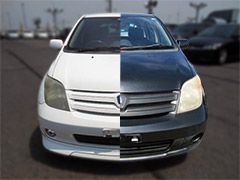Do Black Cars Get Hotter In The Summer? - Vol.279
Many people who live in or relocate to warmer climates have concerns regarding the color of their vehicle. Owning a black car when you reside in a tropical or subtropical climate could make you wonder if your vehicle is going to become too hot during the summer. Most people have experienced the extreme discomfort of getting into a car that is too hot. The stifling air and high heat can leave you breathless and feeling sick.

The Science
Plainly stated, dark colors absorb heat while light colors reflect heat. Being specific, the heat that we are referring to is the heat created by the rays of the sun. Understanding this, it is not farfetched to assume that a black car is going to become much hotter than a white car. This theory has been discussed at length, to the point where certain city governments have considered banning the sale of black vehicles in their area.
Dark Vehicle Exteriors
Black is not the only color in jeopardy. Any dark colored vehicle is liable to become hot in the summer sun. How much hotter is the question. Numerous studies and tests have been performed, the results of each will at the very least agree that the exterior of the vehicle becomes hotter than that of a light colored vehicle. However, this exterior heat does not necessarily translate into a heated interior environment.
Dark Vehicle Interiors
Just as with a dark exterior the vehicle will become hot, a car with a dark interior will also absorb more heat. Most studies illustrate that a dark gray interior will become hotter faster than a light tan interior, yet in the end, both vehicles will end up being the same temperature inside. In this case, it is not that the darker vehicle gets hotter, it simply reaches a hot temperature more quickly.
Leather Seating and Components
Throwing many of the color theories out the window is the beloved leather interior and upholstery feature. Leather, whether it is on your seats, dash, or steering wheel, is going to become obscenely hot if allowed to sit uncovered in the summer sun. It does not matter if the leather is tan, beige, gray, black, or purple polka dots. Thanks to the natural fiber properties of this animal skin, your leather upholstery can become hot enough to cause burns to the skin, even if it were white.
Leaving Ventilation Space
Many people who live in warm and hot climates insist on leaving a window or vent cracked during the summer months. The common theory is that this allows for more air flow and ventilation within the vehicle. More ventilation should mean a lower overall temperature. Unfortunately, leaving a window cracked does not actually lower the temperature of the vehicle, white or black.
Fuel Efficiency
Those who are pushing to have the black cars banned in their area bring up an interesting point about fuel efficiency and vehicle performance. This theory states that a dark vehicle will become very hot, that heat will then soak into the car's interior, and the driver will have to use more fuel to run the air conditioner longer to bring the temperature back down. In reality, because the dark exterior of the car has little bearing on the interior's temperature, a black car is not going to run less efficiently than a white one.
In the end, it is a matter of personal preference. All of the studies that have been conducted lend credence to a yes and a no answer to the car color question. As there is scientific proof that a dark or black vehicle only heats more quickly, not to a higher temperature, why not go ahead and buy that black sedan?